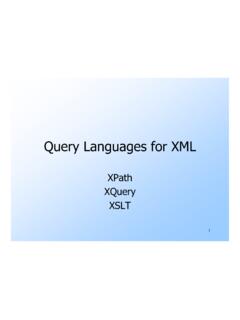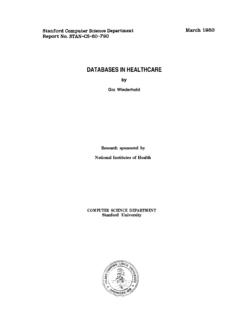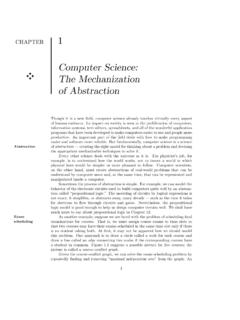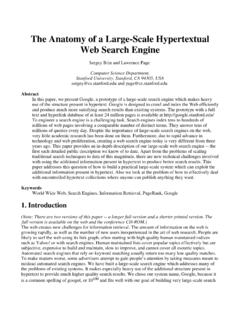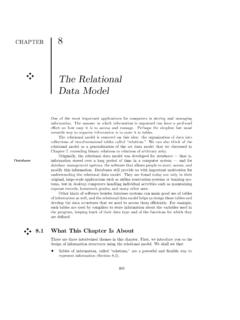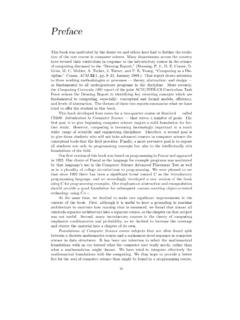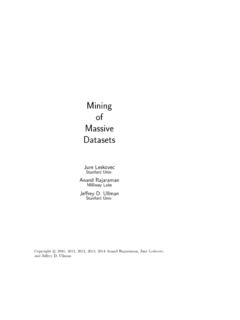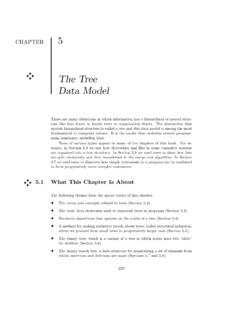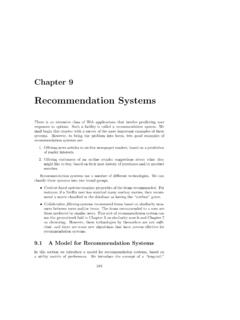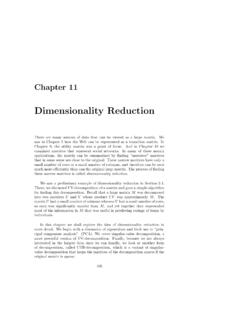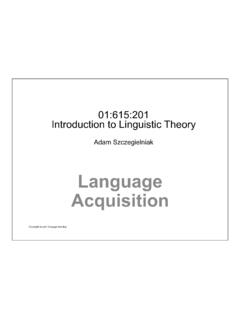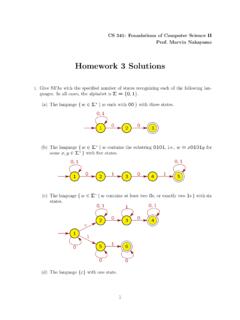Transcription of Context-Free Grammars - Stanford University
1 1 Context-Free GrammarsFormalismDerivationsBackus-Naur FormLeft- and Rightmost Derivations2 Informal Comments A Context-Free grammaris a notation for describing languages. It is more powerful than finite automata or RE s, but still cannot define all possible languages. Useful for nested structures, , parentheses in programming Comments (2) Basic idea is to use variables to stand for sets of strings ( , languages). These variables are defined recursively, in terms of one another. Recursive rules ( productions ) involve only concatenation. Alternative rules for a variable allow : CFG for { 0n1n| n >1} Productions:S -> 01S -> 0S1 Basis: 01 is in the language . Induction: if w is in the language , then so is Formalism Terminals= symbols of the alphabet of the language being defined. Variables= nonterminals= a finite set of other symbols, each of which represents a language .
2 Start symbol= the variable whose language is the one being A productionhas the form variable -> string of variables and terminals. Convention: A, B, C,.. are variables. a, b, c,.. are terminals.., X, Y, Z are either terminals or variables.., w, x, y, z are strings of terminals only. , , ,.. are strings of terminals and/or : Formal CFG Here is a formal CFG for { 0n1n| n >1}. Terminals = {0, 1}. Variables = {S}. Start symbol = S. Productions =S -> 01S -> 0S18 Derivations Intuition We derivestrings in the language of a CFG by starting with the start symbol, and repeatedly replacing some variable A by the right side of one of its productions. That is, the productions for A are those that have A on the left side of the ->.9 Derivations Formalism We say A => if A -> is a production. Example: S -> 01; S -> 0S1. S => 0S1 => 00S11 => Derivation =>* means zero or more derivation steps.
3 Basis: =>* for any string . Induction: if =>* and => , then =>* .11 Example: Iterated Derivation S -> 01; S -> 0S1. S => 0S1 => 00S11 => 000111. So S =>* S; S =>* 0S1; S =>* 00S11; S =>* Forms Any string of variables and/or terminals derived from the start symbol is called a sentential form. Formally, is a sentential form iff S =>* .13 language of a Grammar If G is a CFG, then L(G), the language of G, is {w | S =>* w}. Note: w must be a terminal string, S is the start symbol. Example: G has productions S -> and S -> 0S1. L(G) = {0n1n| n >0}.Note: is a legitimateright Languages A language that is defined by some CFG is called a Context-Free language . There are CFL s that are not regular languages, such as the example just given. But not all languages are CFL s. Intuitively: CFL s can count two things, not Notation Grammars for programming languages are often written in BNF (Backus-Naur Form).
4 Variables are words in <..>; Example: <statement>. Terminals are often multicharacter strings indicated by boldface or underline; Example: whileor Notation (2) Symbol ::= is often used for ->. Symbol | is used for or. A shorthand for a list of productions with the same left side. Example: S -> 0S1 | 01 is shorthand for S -> 0S1 and S -> Notation Kleene Closure Symbol .. is used for one or more. Example: <digit> ::= 0|1|2|3|4|5|6|7|8|9<unsigned integer> ::= <digit>.. Note: that s not exactly the * of RE s. Translation: Replace .. with a new variable A and productions A -> A | .18 Example: Kleene Closure Grammar for unsigned integers can be replaced by:U -> UD | DD -> 0|1|2|3|4|5|6|7|8|919 BNF Notation: Optional Elements Surround one or more symbols by [..] to make them optional. Example: <statement> ::= if<condition> then<statement> [; else<statement>] Translation: replace [ ] by a new variable A with productions A -> |.
5 20 Example: Optional Elements Grammar for if-then-else can be replaced by:S -> iCtSAA -> ;eS | 21 BNF Notation Grouping Use {..} to surround a sequence of symbols that need to be treated as a unit. Typically, they are followed by a .. for one or more. Example: <statement list> ::= <statement> [{;<statement>}..]22 Translation: Grouping You may, if you wish, create a new variable A for { }. One production for A: A -> . Use A in place of { }.23 Example: GroupingL -> S [{;S}..] Replace by L -> S [ ] A -> ;S A stands for {;S}. Then by L -> SB B -> | A -> ;S B stands for [ ] (zero or more A s). Finally by L -> SB B -> C | C -> AC | A A -> ;S C stands for .24 Leftmost and Rightmost Derivations Derivations allow us to replace any of the variables in a string. Leads to many different derivations of the same string. By forcing the leftmost variable (or alternatively, the rightmost variable) to be replaced, we avoid these distinctions without a difference.
6 25 Leftmost Derivations Say wA =>lmw if w is a string of terminals only and A -> is a production. Also, =>*lm if becomes by a sequence of 0 or more => : Leftmost Derivations Balanced-parentheses grammmar:S -> SS | (S) | () S =>lmSS =>lm(S)S =>lm(())S =>lm(())() Thus, S =>*lm(())() S => SS => S() => (S)() => (())() is a derivation, but not a leftmost Derivations Say Aw =>rm w if w is a string of terminals only and A -> is a production. Also, =>*rm if becomes by a sequence of 0 or more => : Rightmost Derivations Balanced-parentheses grammmar:S -> SS | (S) | () S =>rmSS =>rmS() =>rm(S)() =>rm(())() Thus, S =>*rm(())() S => SS => SSS => S()S => ()()S => ()()() is neither a rightmost nor a leftmost derivation.
